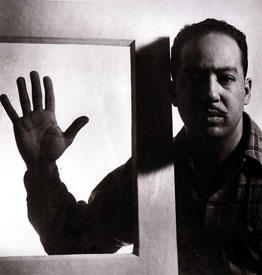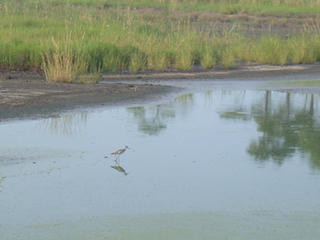
An Elegy for Summer: Two Poems by Stanley Kunitz
The poet Stanley Kunitz celebrated his 100th birthday on July 29, 2005. While he's been writing for more than three-quarters of a century, I've been acquainted with his work for only a little more than a decade. I bought his book Passing Through shortly before visiting Provincetown, Massachusetts several years ago. He has a house there, which he shared with his wife, Elise Asher, an artist whose expressionistic and evocative painting "The Long Boat" graces the cover of Passing Through. Elise died a few years ago. Mr. Kunitz still spends summers in Provincetown, cultivating his terraced garden. His fame there is based in equal parts on his presence as a constant gardener and his eloquent writing.
Mr. Kunitz's summer home—he lives in New York City part time—is on the far west end of Commercial Street, Provincetown's main thoroughfare. Commercial Street, a narrow one-way road shared during the busy summer season by cars, bicycles, and people walking and rollerblading, starts in the east end of town. Traveling west, by whatever means one chooses, the visitor passes charming salt box houses surrounded on all sides by dune grasses and wildflowers; Norman Mailer's home, which is the only brick house in town; the former home of novelist John Dos Passos and his wife Katie; a stone and brass marker on the site where the Provincetown Players gathered and presented the plays of Eugene O'Neill in the 1920s; the Provincetown Art Museum; a string of small art galleries featuring the works of locally famous artists; and the beginnings of dozens of retail stores.
At the center of town, still heading west, depending on the season, drag queens as tall and broad as any NBA star stroll together singing gay-appropriated anthems first sung by Donna Summer, Cher, and Barbara Streisand; Spiritus Pizza, a hang out most popular after the bars close in the earliest morning hours; ubiquitous bed & breakfasts; and, in the midst of this gay Mecca, a Coast Guard station. Commercial Street makes a sharp turn at this point, passing the locally celebrated artist John Dowd's home, notable for the bust of Shakespeare peering down on passers-by from an upstairs window, and becomes a residential precinct. It is along this last stretch of road that one can glimpse, if he pauses long enough and pays close attention, Stanley Kunitz tending his garden with precision and assurance.
 For a very long time I've wanted to send Mr. Kunitz pictures of my own garden. While far more modest than his, I draw my inspiration for planting from the mental image I carry of him, trowel in hand. After one of my first visits to Provincetown, I mailed him my copy of Passing Through. I included a note praising his garden and asking him to autograph the book. One day, several weeks later, I was thrilled to find a padded envelope, the same one I'd addressed to myself in hopes he'd use it to return the book, in my mailbox. In the book, he wrote: "To Michael Owens, who stopped by my garden gate. Yes, that was a border of lamb's-ears you spotted on the top tier!"
For a very long time I've wanted to send Mr. Kunitz pictures of my own garden. While far more modest than his, I draw my inspiration for planting from the mental image I carry of him, trowel in hand. After one of my first visits to Provincetown, I mailed him my copy of Passing Through. I included a note praising his garden and asking him to autograph the book. One day, several weeks later, I was thrilled to find a padded envelope, the same one I'd addressed to myself in hopes he'd use it to return the book, in my mailbox. In the book, he wrote: "To Michael Owens, who stopped by my garden gate. Yes, that was a border of lamb's-ears you spotted on the top tier!" One day, he will join his wife Elise and they will together make heaven a better place. In the meantime, I imagine him putting his Provincetown garden to sleep as he prepares to return to New York City. Or perhaps he'll think better of it this year and decide to keep watch over the dormant terraces.
Here are two favorite poems by Stanley Kunitz. The End of Summer comes recommended by my friend Ada, a fellow admirer of Kunitz's work. The last line in the third stanza is one of the most poignant I’ve ever read. It's most appropriate this week as the equinox overtakes us and we lumber into autumn. The other poem, Day of Foreboding, has resonated for me since I first cracked the spine of Passing Through, back in 1996.
The End of Summer
An agitation of the air,
A perturbation of the light
Admonished me the unloved year
Would turn on its hinge that night.
I stood in the disenchanted field
Amid the stubble and the stones,
Amazed, while a small worm lisped to me
The song of my marrow-bones.
Blue poured into summer blue,
A hawk broke from his cloudless tower,
the roof of the silo blazed, and I knew
that part of my life was over.
Already the iron door of the north
Clangs open: birds, leaves, snows
Order their population forth,
And a cruel wind blows.
Day of Foreboding
Great events are about to happen.
I have seen migratory birds
in unprecedented numbers
descend on the coastal plain,
picking the margins clean.
My bones are a family in their tent
huddled over a small fire
waiting for the uncertain signal
to resume the long march.
Stanley Kunitz photographed in his Provincetown garden by Renate Ponsold



